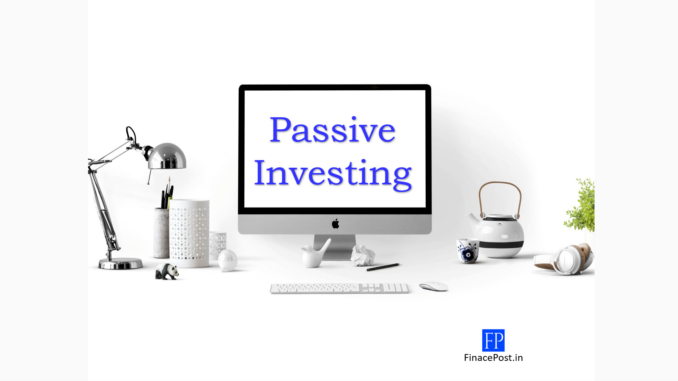
Last updated on May 9th, 2021 at 10:28 am
Passive investing is an investment strategy that focuses on maximizing returns by minimizing the juggle between buying and selling stocks. Index Investing is one such strategy whereby the investors neither aim at market timing nor consider short-term market fluctuations to earn profits. Hence passive investing includes buying index funds for long-term gains.
Warren Buffet says Index Funds are the best way for everyday investors to grow their money- Let’s find out how Index Funds work?
Index investing has nowadays become an eye-catcher for investors who understand the benefits of diversifying their portfolio across assets. Let’s understand index investing and how it differs from active investing.
In simpler terms, many investors have gone through the experience that though the markets are going up and there is a bull run but still the stocks in which they have invested are not performing well! Have you ever wondered why? Well, this is due to the fact that investors often miss on diversification and tend to focus on a particular or a few stocks. To overcome this challenge, investing in index funds comes to the rescue. Let’s understand this further.
What are Index Funds?
An Index Fund is a type of mutual fund that focuses on maintaining uniformity and balances risk in the portfolio. It does not focus on market timing that is there are no strategies to buy and sell the stocks rather it aims to imitate the market index. Its goal is to match the fund’s performance with the market’s performance.
An Index Fund consists of a broader basket of assets instead of a few investments. It aims at minimizing the unsystematic risk associated with a specific company or industry without affecting the returns. An index mutual fund invests in stocks that imitate a stock market index like Nifty 50, Nifty Midcap 100, etc.
In an Index Fund, the fund manager would invest in the same securities as present in the underlying index in the same proportion without changing the portfolio composition. For example, if the Tata Consultancy Services (TCS) and Avenue Supermarts hold 10% and 5% of the weightage of Nifty 50, then the Index Fund would allocate 10% of its assets to TCS and 5% to Avenue.
Nifty gives an average view of the market. Hence an Index is a group of securities that defines a market segment. If Nifty is up by 10%, the Index will also be up by 10% and vice versa also holds true.
How Index Funds differ from Active Funds?
In an active fund, during a fall in the stock prices, the fund manager churns the portfolio to exit from the falling stocks and replacing it with another stock. Even when the stocks are up, they tend to book profits early to avoid any losses from fall in the future. However, in an Index fund, there is minimum juggling in the portfolio as they track the index rather than a particular stock.
Read more about essentials for passive Investing in India by GLide Invest
Are Index Funds cheaper?
Hence, in an active investment strategy, constant juggling is seen in the portfolio. The active fund manager changes the composition of the portfolio based on his assessment of the present and expected future performance of the underlying securities/stocks. Since index funds replicate market index hence it tries to match the returns offered by the underlying index. Since the fund is passively managed, there is no need to spend much time on research that reduces the fund management cost. Thus, Index funds have a lower expense ratio as compared to actively managed funds. To understand the impact of the low-cost ratio on returns to the investor, please refer to the below example:
[su_table]
INR crore
|
Type of MF |
Amount Invested | Gross Return | TER (per annum) | Net Return | No. of years | Value in 30 years | Variance In return |
% Variance |
|
Regular Equity MF |
0.1 | 12% | 2% | 10% | 30 | 1.74 | ||
| Direct Equity MF | 0.1 | 12% | 1% | 11% | 30 | 2.29 | 0.63 |
36% |
|
Index Fund |
0.1 | 12% | 0.10% | 12% | 30 | 2.92 | 1.17 |
67% |
[/su_table]
As seen in the table all the three types of mutual funds i.e. Regular MF, Direct Equity Mutual Fund, and Index Fund are taken and the difference in their returns can be observed. To elucidate further, suppose an investor invests Rs 10, 00,000 in each type of MF for 30 years. The expense ratio in the Regular equity fund is more as same is sourced through a broker and there are frequent buying and selling of stocks to maximize returns. In Direct Fund MF, the expense ratio falls further as an investment is direct through asset management companies. However, the expense ratio is the lowest in the Index Funds as they track an index rather than a particular stock.
The comparative return given by the Index fund is higher by 67% (INR 1.17 cr higher) as compared to regular MF. Similarly, Index fund returns are higher by 36% (INR 0.63 cr higher) when compared to direct equity MF. This clearly shows that over a long tenure, Index Funds could give superior returns as compared to actively managed mutual funds.
Who should invest in Index Funds?
Index Funds tend to be less volatile as the portfolio is well diversified. Index investment strategy offers exposure to a wide range of equities with low risk. It is best suited for long-term investors and risk-averse investors.
They are best suited for those who have a long-term vision to build wealth but want to avoid constant researching and juggle in the portfolio.
Since the index funds are passively managed, few trades take place during a given year. Hence fewer capital gains arise for investors to be taxed. This results in the tax advantage of the index funds.
To summarise, here are the key takeaways of the Index Funds
- Index Funding is a long-term low-risk form of investment.
- The return on the funds replicates the returns on the underlying index.
- The fund has a lower expense ratio.
- Index Funding does not require frequent juggling of the portfolio. Also, there is no need to track it on a daily basis.
- Index Funding results in a well-diversified portfolio.
What is Glide Invest: It is a simple, low-cost (stress-free) wealth management platform that helps people become financially independent through all stages of life. The app assists in Goal-Based Investing and provides personalized portfolio solutions (using asset allocation for diversification) for individual investors depending upon their risk profile and financial goals. It is an initiative by Motilal Oswal Investment Services.
It is a simple, low-cost (stress-free) wealth management platform that helps people become financially independent through all stages of life. The app assists in Goal-Based Investing and provides personalized portfolio solutions (using asset allocation for diversification) for individual investors depending upon their risk profile and financial goals. It is an initiative by Motilal Oswal Investment Services.
Glide Invest application is available in Google Play or App Store or can be downloaded by clicking below.
Related Posts
- One MobiKwik Systems Limited, MobiKwik IPO - 14/10/2021
- Bharti Airtel Rights Issue- Should You Subscribe? - 07/10/2021
- How to Check your IPO Allotment status? - 28/09/2021
Disclaimer: The above content is for general info purpose only and does not constitute professional advice. The author/ website will not be liable for any inaccurate / incomplete information and any reliance you place on the content is strictly at your risk.
Follow us on Social Media by clicking below
Follow @financepost_in
Be the first to comment